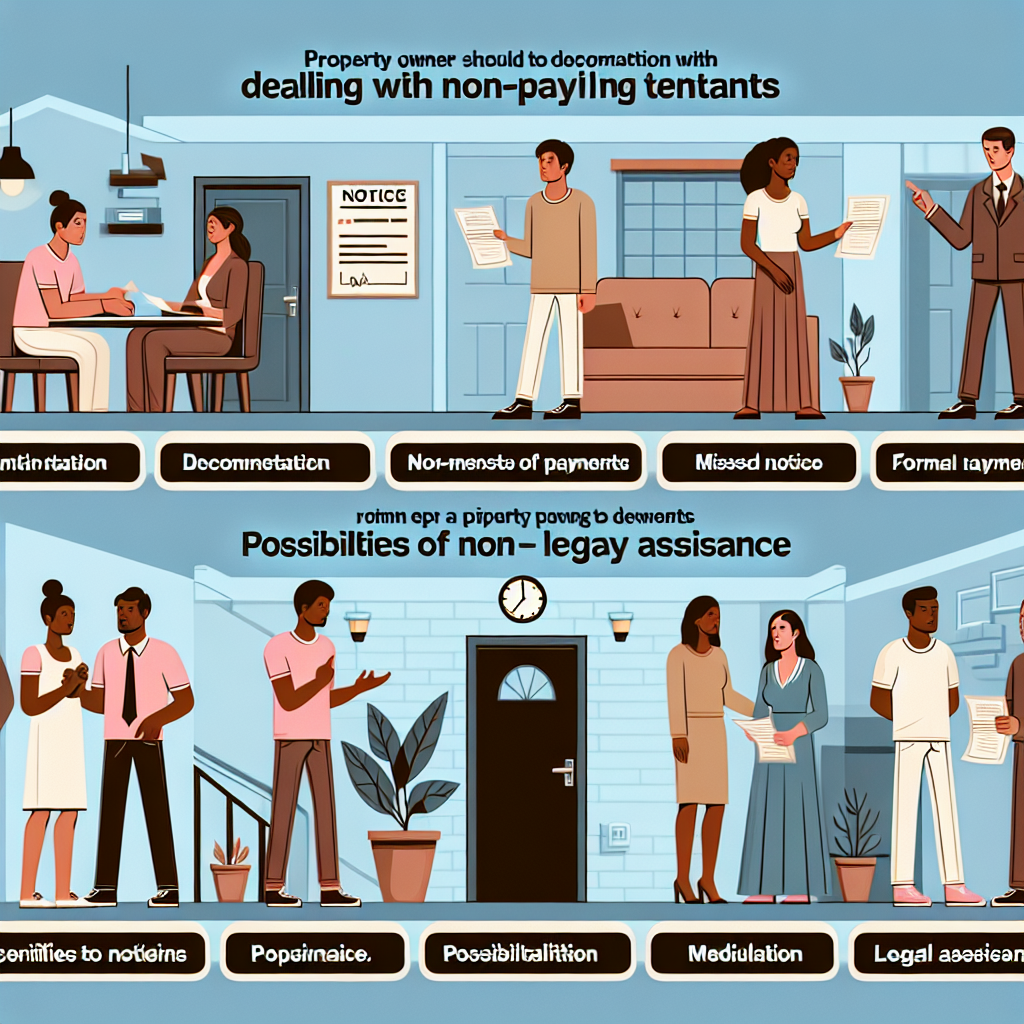-
Table of Contents
- Dealing with Non-Paying Tenants: Your Action Plan
- Understanding the Problem
- Preventive Measures
- Screening Tenants
- Clear Lease Agreements
- Immediate Actions When Rent is Late
- Communication
- Late Payment Notices
- Legal Steps
- Understanding Local Laws
- Serving an Eviction Notice
- Filing for Eviction
- Practical Tips for Managing Non-Paying Tenants
- Payment Plans
- Cash for Keys
- Hiring a Property Manager
- Case Studies
- Case Study 1: Successful Payment Plan
- Case Study 2: Cash for Keys
- Statistics and Insights
- Conclusion
Dealing with Non-Paying Tenants: Your Action Plan

As a landlord, dealing with non-paying tenants can be one of the most challenging aspects of property management. It not only affects your cash flow but can also lead to legal complications and emotional stress. This article provides a comprehensive action plan to help you navigate this difficult situation effectively. We will cover preventive measures, legal steps, and practical tips to manage non-paying tenants.
Understanding the Problem
Before diving into solutions, it’s crucial to understand why tenants might fail to pay rent. Common reasons include:
- Job loss or financial hardship
- Medical emergencies
- Disputes over property conditions
- Mismanagement of finances
- Intentional non-payment
Understanding the root cause can help you tailor your approach to resolving the issue.
Preventive Measures
Screening Tenants
The best way to deal with non-paying tenants is to avoid them in the first place. Effective tenant screening can significantly reduce the risk of rent defaults. Here are some steps to follow:
- Conduct background checks
- Verify employment and income
- Check credit scores
- Contact previous landlords for references
According to a study by TransUnion, landlords who perform thorough background checks are 15% less likely to face rent defaults.
Clear Lease Agreements
A well-drafted lease agreement can serve as a strong deterrent against non-payment. Ensure that your lease includes:
- Clear payment terms and due dates
- Penalties for late payments
- Procedures for handling disputes
- Eviction policies
Having these terms clearly outlined can provide legal backing if you need to take action against a non-paying tenant.
Immediate Actions When Rent is Late
Communication
The first step when a tenant misses a payment is to communicate. Sometimes, a simple reminder can resolve the issue. Here are some tips for effective communication:
- Send a polite reminder email or text
- Follow up with a phone call if there is no response
- Document all communications for future reference
According to a survey by Buildium, 60% of landlords found that direct communication resolved late payment issues within a week.
Late Payment Notices
If communication doesn’t resolve the issue, the next step is to send a formal late payment notice. This document should include:
- The amount due
- Late fees (if applicable)
- A deadline for payment
- Consequences of non-payment
This notice serves as a formal record and can be used in legal proceedings if necessary.
Legal Steps
Understanding Local Laws
Before taking any legal action, it’s crucial to understand the landlord-tenant laws in your jurisdiction. These laws vary by state and can significantly impact your options. Key areas to research include:
- Notice periods for late payments
- Eviction procedures
- Tenant rights
- Legal requirements for documentation
Consulting with a local attorney can provide valuable insights and ensure that you comply with all legal requirements.
Serving an Eviction Notice
If the tenant continues to default on rent, you may need to serve an eviction notice. This is a formal document that informs the tenant of your intention to evict them if they do not pay the overdue rent. The notice should include:
- The amount due
- A deadline for payment
- Instructions for how to pay
- Consequences of non-payment
Ensure that you follow the legal requirements for serving this notice, as improper service can delay the eviction process.
Filing for Eviction
If the tenant still does not pay, the next step is to file for eviction in court. This process involves:
- Filing a complaint with the local court
- Serving the tenant with a court summons
- Attending a court hearing
- Obtaining a court order for eviction
According to the U.S. Department of Housing and Urban Development, the average eviction process takes about three to four weeks, but this can vary depending on local laws and court schedules.
Practical Tips for Managing Non-Paying Tenants
Payment Plans
In some cases, offering a payment plan can be a win-win solution. This approach allows the tenant to catch up on overdue rent while you continue to receive payments. Key elements of a payment plan include:
- A clear schedule for payments
- Consequences for missed payments
- Documentation of the agreement
According to a survey by the National Apartment Association, 40% of landlords who offered payment plans were able to recover overdue rent without resorting to eviction.
Cash for Keys
If eviction seems inevitable, a “cash for keys” arrangement can expedite the process. This involves offering the tenant a financial incentive to vacate the property voluntarily. While this may seem counterintuitive, it can save you time and legal fees. Steps to follow include:
- Agreeing on a reasonable amount
- Documenting the agreement
- Inspecting the property before payment
This approach can be particularly effective in avoiding the lengthy eviction process and minimizing property damage.
Hiring a Property Manager
If managing non-paying tenants becomes overwhelming, consider hiring a property manager. These professionals can handle tenant screening, rent collection, and legal proceedings on your behalf. Benefits of hiring a property manager include:
- Expertise in handling difficult tenants
- Knowledge of local laws
- Time savings
- Reduced stress
According to a study by the National Association of Residential Property Managers, landlords who use property managers experience 20% fewer rent defaults.
Case Studies
Case Study 1: Successful Payment Plan
John, a landlord in California, faced a situation where his tenant, Sarah, lost her job and fell behind on rent. Instead of immediately pursuing eviction, John offered Sarah a payment plan. They agreed on a schedule where Sarah would pay an additional $200 per month until the overdue rent was cleared. Within six months, Sarah was back on track, and John avoided the costs and stress of eviction.
Case Study 2: Cash for Keys
Emily, a landlord in New York, had a tenant who consistently missed rent payments and caused property damage. After several failed attempts to resolve the issue, Emily offered the tenant $1,000 to vacate the property within two weeks. The tenant accepted, and Emily was able to re-rent the property to a more reliable tenant within a month, saving her time and legal fees.
Statistics and Insights
Understanding the broader landscape can provide valuable context for dealing with non-paying tenants. Here are some relevant statistics:
- According to the U.S. Census Bureau, 6.7% of renters were behind on rent as of 2022.
- A study by the National Multifamily Housing Council found that 92% of renters made full or partial rent payments by the end of each month in 2021.
- The average cost of an eviction ranges from $3,500 to $10,000, including legal fees, lost rent, and property repairs, according to TransUnion.
These statistics highlight the importance of proactive measures and effective management strategies to minimize the impact of non-paying tenants.
Conclusion
Dealing with non-paying tenants is a complex and often stressful aspect of property management. However, by implementing preventive measures, maintaining clear communication, and understanding your legal options, you can effectively manage this challenge. Whether through offering payment plans, pursuing eviction, or hiring a property manager, there are multiple strategies to address non-payment issues. By staying informed and proactive, you can protect your investment and maintain a positive landlord-tenant relationship.
In summary, the key takeaways for dealing with non-paying tenants include:
- Effective tenant screening and clear lease agreements
- Prompt communication and formal notices
- Understanding and complying with local laws
- Exploring practical solutions like payment plans and cash for keys
- Considering professional property management services
By following this action plan, you can navigate the challenges of non-paying tenants with confidence and minimize the impact on your property business.








